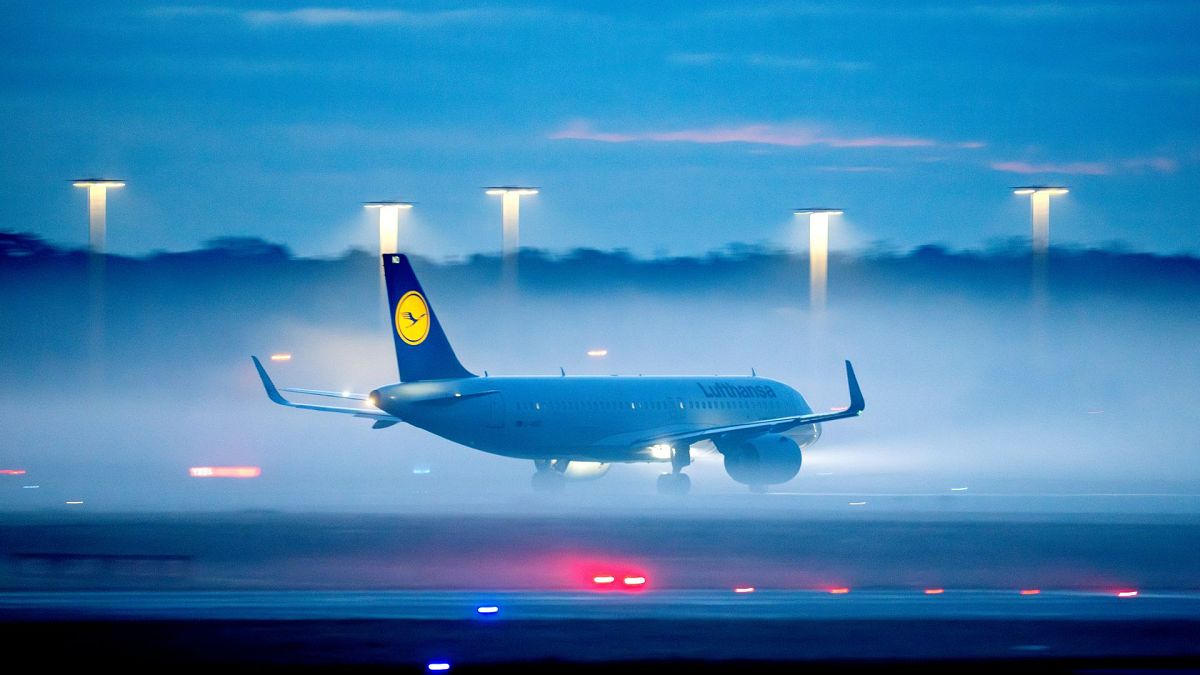German airports are at a standstill today (Thursday) due to a workers' strike.
Security employees have walked out at airports across the country to demand higher wages.
Some airports, including Hamburg Berlin Brandenburg, have said that no flights will depart until at least 10pm tonight. Some arrivals are also affected.
The walkout will also impact Bremen, Hannover, Cologne, Düsseldorf, Dresden, Erfurt, Frankfurt, Leipzig and Stuttgart airports.
Germany’s flag carrier Lufthansa has advised passengers not to come to the airport.
Here’s everything you need to know if you have a flight booked in Germany on Thursday.
Passengers with departing flights advised not to travel
Lufthansa strongly recommends anyone with a departing flight booked from Frankfurt, Hamburg, Bremen, Berlin, Leipzig, Düsseldorf, Cologne, Hanover, Stuttgart and Dresden not to come to the airport.
It says there is no access to the departure area at these airports, as the security checkpoints are closed. This means passengers will not be able to complete the checks needed to legally be able to fly.
This also applies to those who are travelling to Frankfurt Airport by train for a connecting flight.
Flights between at least 3 am on 1 February and 3 am on 2 February are expected to be impacted.
How are airports impacted by German strikes?
Berlin Brandenburg, Hamburg and Frankfurt Airport have confirmed that no flights will depart today.
Frankfurt has warned of “major disruptions and flight cancellations throughout the day”. Security checkpoints will be closed, meaning passengers will not be able to complete the checks necessary to fly.
In a statement, Frankfurt airport said: "We advise all originating passengers to avoid coming to the airport on February 1. Please contact your airline or travel operator for information regarding your flight. Transfer and connecting passengers should also expect strong disruptions and delays due to the strike."
Dusseldorf, Cologne Bonn, Leipzig Halle and Dresden airports have warned of delays and flight cancellations on 1 February, advising passengers to check their flight status with their airlines.
Munich Airport is not impacted by the strike action.
What to do if you have a flight booked in Germany on Thursday
If you have a flight booked at an affected airport, you should check its status with your airline before travelling to the airport. You can do this via airline or airport websites, apps and social media.
Information on Lufthansa flights will be kept updated on the airline’s website and app, where passengers can also rebook their flight through the Service Centre.
Under EU rules, if your flight is cancelled the airline must give you a refund or reschedule the flight, even if it means using a different carrier.
You are also entitled to extra compensation and accommodation expenses, if necessary.
Lufthansa customers can rebook for free on a flight departing before or after 1 February, for the period between 30 January and 8 February. This also applies to those travelling on international flights with a connection at Frankfurt Airport, as they are expected to face delays.
Trains are available for many flight routes
If you have a domestic Lufthansa flight booked to or from Frankfurt on 1 February, you can switch to a train ticket free of charge via the airline’s website - even if your flight has not yet been cancelled.
Eurowings will also be severely impacted by the strikes, with “massive disruptions” expected. It says it will inform affected passengers and, where possible, offer alternative connections or rebookings to rail.
Austrian Airlines has warned of possible delays to its flight schedule on Thursday. Passengers who provided their phone number or email on booking will be contacted directly about any changes. Updates can be found on the airline’s website and app.
Why are airport workers in Germany going on strike?
Union Verdi says it has been negotiating on behalf of around 25,000 employees with the Federal Association of Aviation Security Companies (BDLS).
They are demanding a wage increase of €2.80 per hour to offset inflation, as well as increased bonuses and overtime pay.
“The work of the aviation security forces must remain financially attractive so that the urgently needed skilled workers can be recruited and retained,” Verdi said in a press release on Tuesday.
“There is already a shortage of qualified workers who are willing to work extremely flexibly at the airports around the clock, on weekends and on public holidays - security in air traffic does not come for free.”
A 4 per cent wage increase in 2024, equating to between €0.55 and €0.82 per hour, followed by a further 3 per cent increase in 2025 has been floated by the employer. Verdi has dismissed this as “inadequate” in addressing inflation.
Collective bargaining negotiations will resume on 6-7 February.


